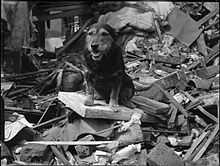Rip (dog)
| Rip | |
|---|---|
 A photograph of Rip from 1941. | |
| Species | Canis lupus familiaris |
| Breed | Mixed breed terrier |
| Sex | Male |
| Died | 1946 |
| Resting place |
PDSA Cemetery Ilford, England |
| Occupation | Search and rescue dog |
| Owner | E. King |
|
Dickin Medal Blue Cross Medal | |
Rip (died 1946), a mixed-breed terrier, was a Second World War search and rescue dog who was awarded the Dickin Medal for bravery in 1945. He was found in Poplar, London, in 1940 by an Air Raid warden, and became the service's first search and rescue dog. He is credited with saving the lives of over 100 people. He was the first of twelve Dickin Medal winners to be buried in the PDSA's cemetery in Ilford, Essex.
Rescue career

Rip was found as a stray following a heavy bombing raid of Poplar, London in 1940 by Air Raid Warden Mr E. King.[1] He was thrown scraps by Mr King, who expected the dog to leave, but the two struck up a friendship.[2] Mr King worked at post B132 in Poplar, London where Rip was adopted as mascot of the Southill Street Air Raid Patrol.[3] He began acting as an unofficial rescue dog, being used to sniff out casualties trapped beneath buildings,[1] and became the service's first search and rescue dog.[2]
Rip was not trained for search and rescue work, but took to it instinctively.[4] In twelve months between 1940 and 1941, he found over a hundred victims of the air raids in London.[2] His success has been held partially responsible for prompting the authorities to train search and rescue dogs towards the end of World War II.[5]
| “ | How welcome to the victims must have been the first sounds of those scrabbling paws, shrill terrier yaps, and the first sight of the grinning Tommy Brock face with its merry friendly eyes. | ” |
| —Jilly Cooper, Animals in War (1983)[6] | ||
Awards
.jpg)
Rip was awarded the Dickin Medal in 1945,[7] two years after it was introduced. The citation reads: "For locating many air-raid victims during the blitz of 1940".[3] He would go on to wear the medal on his collar until the day he died. His medal was sold at auction in Bloomsbury, London on 23 April 2009.[2] Medal specialists Spink of London predicted that the medal would sell for £10,000,[2] but at the auction it fetched £24,250, a record price for a Dickin Medal.[4] The Dickin Medal is often referred to as the animal metaphorical equivalent of the Victoria Cross.[8]
When he died in 1946, Rip became the first of a number of Dickin Medal winners to be buried in the PDSA Cemetery in Ilford, Essex. His headstone reads "Rip, D.M., "We also serve" - for the dog whose body lies here played his part in the Battle of Britain."[2] Twelve recipients of the medal are now buried in the PDSA Cemetery.[4]
See also
Notes
- ↑ 1.0 1.1 Bresse, James (26 April 2009). "Focus On: Rip the Dog's VC Medal". The Daily Mirror. Retrieved 29 November 2010.
- ↑ 2.0 2.1 2.2 2.3 2.4 2.5 Harris, Paul (25 March 2009). "The Blitz hero with a nose for survivors, Rip the dog's bravery medal could fetch £10,000". Daily Mail. Retrieved 29 November 2010.
- ↑ 3.0 3.1 "Ilford Animal Cemetery". PDSA. Retrieved 29 November 2010.
- ↑ 4.0 4.1 4.2 "Animal Version of Victoria Cross Medal is Sold for World Record Sum". K9 Magazine. 24 April 2009. Retrieved 29 November 2010.
- ↑ "War hero dog's medal is auctioned". BBC News]. 24 April 2009. Retrieved 29 November 2010.
- ↑ Reyburn, Scott (24 April 2009). "Medal for Dog Rip, Who Saved 100 People, Fetches 24,250 Pounds". Bloomberg.com. Retrieved 24 December 2010.
- ↑ "Dickin Medal dogs". People's Dispensary for Sick Animals. Retrieved 14 September 2014.
- ↑ Long, David (2012). The animals' VC: for gallantry and devotion: the PDSA Dickin Medal - inspiring stories of bravery and courage. London: Preface. ISBN 9781848093768.